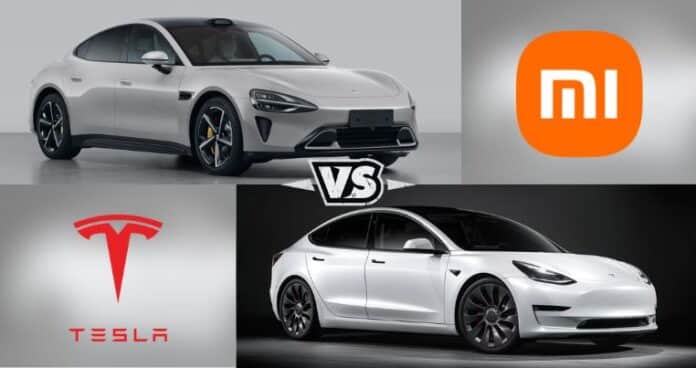Popular Chinese smartphone manufacturer, Xiaomi is ready to take on Tesla in China. Under the leadership of Elon Musk, Tesla has long been a dominant force in the electric vehicle (EV) market with a strong presence in China. The Asian nation is the world’s largest EV market.
Tesla entered China in 2013 and became the first foreign car manufacturer to operate fully independently without a joint venture with a Chinese partner. The American giant’s strategy for China is driven by its vision to manufacture mass-market EVs with compelling value propositions, such as high performance, design, usability, and prestige.
Xiaomi Threatens the Superior Position of Tesla in China
Tesla’s main products in China are the mid-market Model 3 and Model Y, which accounted for 97.3% of its global deliveries in 2021. Tesla also plans to launch the Roadster and the Cybertruck in the future. It’s Chinese market share was 22.6% in the third quarter of 2023, up from 20% a year ago. Tesla’s sales in China reached 3.11 billion USD in this period, which was 48.5% of its US sales. Tesla’s success in China is attributed to its strong brand image, loyal customer base, innovative technology, and local production at its Shanghai Gigafactory.
However, Tesla has also been faces challenges in China, such as rising competition from domestic and foreign EV makers, regulatory uncertainties, supply chain disruptions, and quality issues. Until now, some of Tesla’s main competitors in China were BYD, NIO, XPeng, and Li Auto. Recently these challenges have been exacerbating by Xiaomi, which recently applied for a license to sell EVs in China.
If Xiaomi manages to position itself as a tech-savvy and reliable EV manufacturer, Tesla may find itself contending with a shifting market perception.
Integrated Advantage
Xiaomi’s foray into the EV sector is a strategic move that may alter the dynamics of the Chinese EV market. The company’s reputation as a smartphone giant is a significant advantage, considering its recent success with the latest smartphone running on the innovative HyperOS operating system.
While Tesla has had its share of triumphs and challenges in China, including the Model Y becoming the top-selling EV in the world earlier this year, Xiaomi’s entry introduces a new dimension to the competition. Consumers are likely to be drawn to Xiaomi’s fully integrated OS experience, connecting their EVs with the immensely popular Xiaomi smartphones, potentially diverting attention away from Tesla.
Local Manufacturing
According to reports, Xiaomi’s electric offering is being called the SU7. This stylish and compact EV, manufactured under contract by Beijing Automotive Industry Holding Co. Ltd (BAIC), showcases Xiaomi’s ambition to compete directly with Tesla’s bestselling Model 3.
Xiaomi’s strategic partnership with BAIC for manufacturing aligns with the Chinese government’s emphasis on local production. This can potentially lead to cost advantages and favorable regulatory treatment for Xiaomi, challenging Tesla’s current market position.
Attractive Specifications
The design, described as a mishmash of various European and American cars, aims to capture the attention of performance-minded drivers with its three trim levels – SU7, SU7 Pro, and SU7 Max. The EV’s specifications skillfully observe industry standards, featuring a single 295 horsepower rear motor and an all-wheel-drive option reaching up to 664 horsepower.
Xiaomi’s commitment to technological innovation is evident with the inclusion of a Porsche-style active rear spoiler and a windshield-mounted LIDAR sensor for advanced driver aids. This appeal and advanced features may entice consumers to explore Xiaomi’s offerings. Furthermore, the integration with HyperOS may resonate well with consumers who already own Xiaomi smartphones, potentially influencing their decision-making process when choosing an EV.
Currently, the car is in trial production phase and the deliveries are expected to begin in February 2024.
Also Read
Sony and Honda to Develop Electric Cars with PlayStation Gaming


